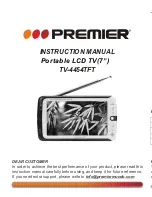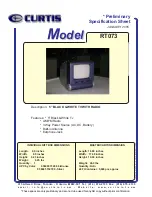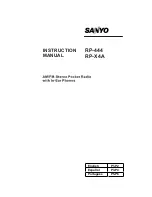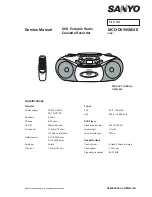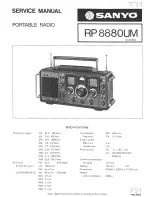
INSTALLATION
18
Battery Connection
The Home Standby Generator is supplied with a 12 Volt DC,
AGM type, 33 Amp-Hour, valve regulated battery. It is a
sealed, lead-acid rechargeable battery. It is installed in the unit
and the battery cables are connected at the factory. The unit’s
15 Amp fuse, which isolates the battery and prevents the unit
from starting, has been removed for shipping. The battery will
lose some charge charge prior to installation of the generator.
If battery voltage is below 12 Volts, charge the battery.
IMPORTANT:
If battery voltage is below 5 Volts, it may not
take a charge and you will need a new battery.
Charging the Battery
If it is necessary to charge the battery, proceed as follows:
1.
Set the generator's “AUTO/OFF/MANUAL” switch to
OFF
.
2.
Remove the 15 Amp fuse from the control panel.
3.
Disconnect the negative battery cable to the negative
battery terminal (indicated by
NEGATIVE, NEG
, or
(-)
.
4.
Charge battery with battery charger at 2 Amps until
battery holds 12 Volts.
NOTE:
DO NOT exceed 13.7 Volts charging.
NOTE:
With the battery installed and utility power available to
the Automatic Transfer Switch, the battery receives a trickle
charge whenever the engine is not running. This process may
take up to 72 hours to fully charge a battery from 5 Volts.
The trickle charge cannot be used to recharge a battery that
is completely discharged.
5.
Connect the negative battery cable to the negative battery
terminal (indicated by
NEGATIVE, NEG
, or
(-)
.
6.
Ensure hardware on both positive and negative battery
terminals is secure.
7.
Reinstall the 15 Amp fuse in the control panel.
8.
Set the generator's “AUTO/OFF/MANUAL” switch to
AUTO
.
Servicing the Battery
If it is necessary to service the battery, proceed as follows:
1.
Set the generator's “AUTO/OFF/MANUAL” switch to
OFF
.
2.
Remove the 15 Amp fuse from the control panel.
3.
Service or replace battery as required.
4.
Connect the red battery cable to the battery positive
terminal (indicated by
POSITIVE
,
POS
, or
(+)
).
5.
Connect the negative battery cable to the negative battery
terminal (indicated by
NEGATIVE, NEG
, or
(-)
.
6.
Ensure hardware on both positive and negative battery
terminals is secure.
7.
Reinstall the 15 Amp fuse in the control panel.
8.
Set the generator's “AUTO/OFF/MANUAL” switch to
AUTO
.
Fuel Supply System
Ensure that all fuel pipe connections are tight, secure and
without leaks.
Ensure that all gas line shutoff valves are OPEN and that
adequate fuel pressure is available whenever automatic
operation is desired.
NOTICE
Failure to disconnect negative battery cable will result in
equipment failure.
• DO NOT attempt to jump start the battery.
• Damage to equipment resulting from failure to follow this
instruction will void warranty.
WARNING
Storage batteries give off explosive hydrogen gas
during recharging.
Slightest spark will ignite hydrogen and cause
explosion.
Battery electrolyte fluid contains acid and is
extremely caustic.
Contact with battery contents will cause severe
chemical burns.
A battery presents a risk of electrical shock and
high short circuit current.
• DO NOT dispose of battery in a fire.
• DO NOT allow any open flame, spark, heat, or lit cigarette
during and for several minutes after charging a battery.
• DO NOT open or mutilate the battery.
• Wear protective goggles, rubber apron, and rubber gloves.
• Remove watches, rings, or other metal objects.
• Use tools with insulated handles.
CAUTION
Installing the 15A fuse could cause the engine to
start.
• DO NOT install this fuse until all plumbing and wiring has been
completed and inspected.
Summary of Contents for 40220
Page 26: ...SCHEMATIC 26 SCHEMATIC ...
Page 27: ...WIRING DIAGRAM 27 WIRING DIAGRAM ...
Page 28: ...EXPLODED VIEW 28 EXPLODED VIEW MAIN UNIT ...
Page 30: ...EXPLODED VIEW 30 EXPLODED VIEW ENCLOSURE ...
Page 32: ...EXPLODED VIEW 32 EXPLODED VIEW CONTROL PANEL ...
Page 60: ...NOTAS 60 ...
Page 86: ...REMARQUES 86 ...
Page 87: ...REMARQUES 87 ...


































